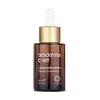What's inside
What's inside
 Key Ingredients
Key Ingredients

 Benefits
Benefits

 Concerns
Concerns

 Ingredients Side-by-side
Ingredients Side-by-side

Water
Skin ConditioningGlycerin
HumectantPropylene Glycol
HumectantPropanediol
SolventPolymethylsilsesquioxane
PEG-40 Hydrogenated Castor Oil
EmulsifyingGinkgo Biloba Leaf Extract
Skin ConditioningSodium Hyaluronate
HumectantResveratrol Dimethyl Ether
AntioxidantQuercetin
AntioxidantPalmitoyl Tripeptide-5
Skin ConditioningMorus Alba Root Extract
Bleaching3-O-Ethyl Ascorbic Acid
Skin ConditioningLecithin
EmollientAlcohol
AntimicrobialTocopheryl Acetate
AntioxidantAmmonium Acryloyldimethyltaurate/Vp Copolymer
Polysorbate 20
EmulsifyingXanthan Gum
EmulsifyingSodium Chloride
MaskingBHT
AntioxidantTriethanolamine
BufferingDisodium EDTA
Sodium Cholate
Skin ConditioningHydroxypropyl Cyclodextrin
MaskingRetinyl Palmitate
Skin ConditioningSodium Hydroxide
BufferingTocopherol
AntioxidantPhenoxyethanol
PreservativeEthylhexylglycerin
Skin ConditioningPotassium Sorbate
PreservativeParfum
MaskingCitronellyl Methylcrotonate
MaskingLimonene
PerfumingLinalool
PerfumingCitral
PerfumingCI 15985
Cosmetic ColorantWater, Glycerin, Propylene Glycol, Propanediol, Polymethylsilsesquioxane, PEG-40 Hydrogenated Castor Oil, Ginkgo Biloba Leaf Extract, Sodium Hyaluronate, Resveratrol Dimethyl Ether, Quercetin, Palmitoyl Tripeptide-5, Morus Alba Root Extract, 3-O-Ethyl Ascorbic Acid, Lecithin, Alcohol, Tocopheryl Acetate, Ammonium Acryloyldimethyltaurate/Vp Copolymer, Polysorbate 20, Xanthan Gum, Sodium Chloride, BHT, Triethanolamine, Disodium EDTA, Sodium Cholate, Hydroxypropyl Cyclodextrin, Retinyl Palmitate, Sodium Hydroxide, Tocopherol, Phenoxyethanol, Ethylhexylglycerin, Potassium Sorbate, Parfum, Citronellyl Methylcrotonate, Limonene, Linalool, Citral, CI 15985
Ingredients Explained
These ingredients are found in both products.
Ingredients higher up in an ingredient list are typically present in a larger amount.
Ginkgo Biloba Leaf Extract comes from the leaves of the Ginkgo tree. It has soothing and antioxidant properties.
The leaves of ginkgo contains flavonoids and terpenoids, potent antioxidants. Antioxidants may protect your skin from damage caused by external sources such as pollution.
Its soothing ability comes from a variety of compounds including biflavones, a type of flavonoid. Studies show gingko biloba has strong anti-inflammatory properties.
Fun fact: This tree is native to China and has been used in traditional Chinese medicine for thousands of years.
Learn more about Ginkgo Biloba Leaf ExtractPhenoxyethanol is a preservative that has germicide, antimicrobial, and aromatic properties. Studies show that phenoxyethanol can prevent microbial growth. By itself, it has a scent that is similar to that of a rose.
It's often used in formulations along with Caprylyl Glycol to preserve the shelf life of products.
Polysorbate 20 is made by combining ethoxylation of sorbitan, ethylene oxide, and lauric acid. It is a mild cleansing agent, surfactant, and emulsifier.
As a surfactant, it helps collect dirt and oils for washing. Emulsifiers prevent oils and water from separating.
Polysorbate 20 also adds scent to a product. Since it is made using sorbitol, it has a sweet scent. Sorbitol can also be found in fruits such as apples and peaches.
The lauric acid used to create Polysorbate 20 is often derived from coconuts.
Polysorbate 20 may not be fungal acne safe.
Learn more about Polysorbate 20Propylene Glycol is an odorless, colorless liquid. As a humectant, it helps skin retain moisture. It also aids in delivering active ingredients.
Another role of this ingredient is preventing a product from melting or freezing. Propylene glycol also adds antimicrobrial properties to a product, elongating product lifespan.
This ingredient is considered an organic alcohol and commonly added into both cosmetics and foods.
Those with sensitive skin or conditions may develop a rash when using this ingredient.
Learn more about Propylene GlycolSodium Hydroxide is also known as lye or caustic soda. It is used to adjust the pH of products; many ingredients require a specific pH to be effective.
In small amounts, sodium hydroxide is considered safe to use. However, large amounts may cause chemical burns due to its high alkaline.
Your skin has a natural pH and acid mantle. This acid mantle helps prevent harmful bacteria from breaking through. The acid mantle also helps keep your skin hydrated.
"Alkaline" refers to a high pH level. A low pH level would be considered acidic.
Learn more about Sodium HydroxideWater. It's the most common cosmetic ingredient of all. You'll usually see it at the top of ingredient lists, meaning that it makes up the largest part of the product.
So why is it so popular? Water most often acts as a solvent - this means that it helps dissolve other ingredients into the formulation.
You'll also recognize water as that liquid we all need to stay alive. If you see this, drink a glass of water. Stay hydrated!
Learn more about Water